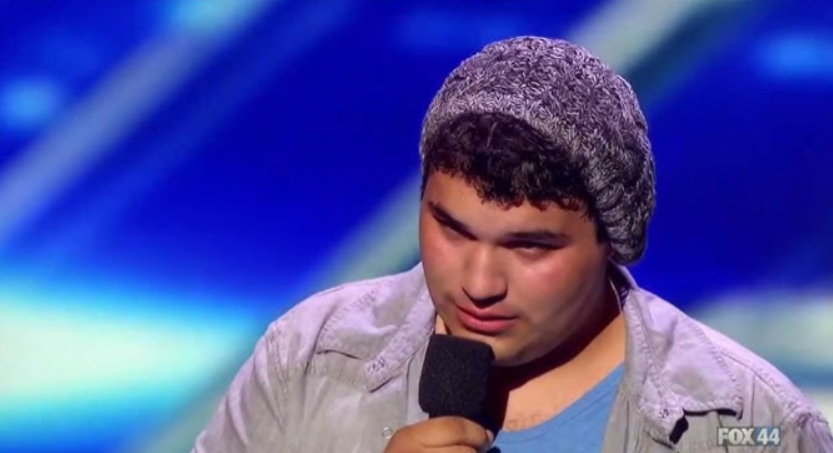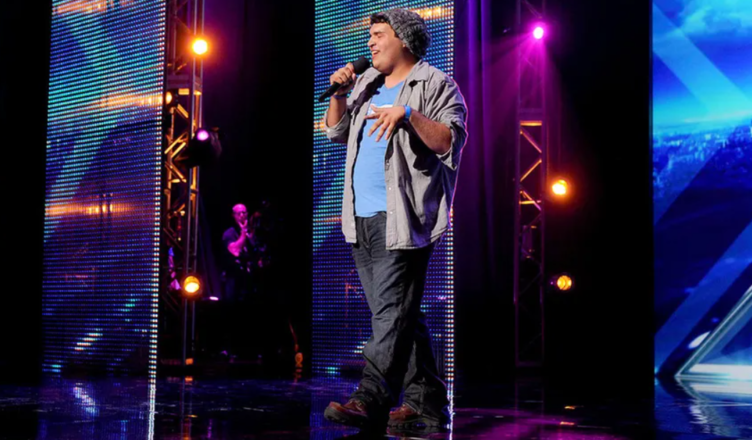When Carlos walked out beneath the glaring stage lights, his hands trembled slightly. He had dreamed of this moment, yet standing on such a massive stage with the eyes of hundreds fixed on him was something he had never fully imagined. The microphone felt heavy in his hand—not just because of the weight of the metal, but because of what it symbolized. For Carlos, it wasn’t only about singing; it was about proving to himself and to the world that his Tourette syndrome would not define his destiny.
The audience sensed his nerves. He shifted his stance, exhaled, and offered a small, hesitant smile. For a fleeting second, a hush of anticipation filled the room, as though everyone collectively wondered: Would he be able to pull this off?
And then he began to sing.
A Voice That Silenced Doubt
Carlos chose “Gravity”—a song known for its soul-stirring lyrics and demanding vocal control. As the first notes poured out of him, something shifted. His earlier jitters melted away, replaced by an intensity that seemed to flow from a deeper place within him.
His voice carried raw emotion, bending effortlessly around the melody, rising and falling like waves on the shore. It wasn’t just flawless in technical execution—it was charged with passion. Every lyric resonated as though it had been written for his journey alone. The audience, who moments earlier had held quiet skepticism, now leaned forward in their seats, caught in the grip of his performance.
Tears welled in the eyes of many who listened. This wasn’t merely a cover—it was Carlos’ story, woven into each line. The invisible battles he had fought for years were laid bare through the honesty of his voice.
A Lifetime of Challenges
Carlos’ triumph on stage didn’t happen overnight. Diagnosed with Tourette syndrome as a child, he had faced a world quick to judge and slow to understand. The tics, involuntary and unpredictable, often drew stares or whispers. Classrooms, hallways, and even social gatherings sometimes became battlegrounds where he had to defend not only his condition but also his right to be treated with dignity.
Yet Carlos refused to let Tourette’s be the full measure of his identity. Music had always been his refuge. When words faltered in conversation, songs gave him freedom. Singing allowed him to bypass the barriers his condition often imposed. Where Tourette’s could create chaos, music offered control and clarity.
Still, his path wasn’t without discouragement. Some teachers doubted his ability to perform. Peers occasionally mocked him. But through it all, Carlos clung to a single truth: that his passion for music burned brighter than the limitations others tried to place on him.
Preparation for the Big Stage
Reaching the stage that night was the result of years of dedication. Carlos practiced relentlessly, not only to refine his voice but also to develop the focus required to manage his tics while performing. Breathing techniques, vocal warm-ups, and sheer mental discipline became part of his daily routine.
“I knew I couldn’t change the fact that I have Tourette’s,” he once shared in an interview. “But I could decide how I would live with it. And I chose to live through music.”
Friends and family watched his commitment with admiration. For them, seeing Carlos on stage wasn’t a surprise—it was the natural outcome of years of determination. Still, they held their breath that evening, knowing how much this chance meant to him.
The Audience Responds
As Carlos reached the final notes of “Gravity,” the theater erupted into applause. People leapt to their feet, clapping and cheering, some still wiping tears from their faces. His nervousness at the start had transformed into a standing ovation, a wave of affirmation that washed over him.
Judges and spectators alike were visibly moved. What they had witnessed wasn’t just a performance—it was a declaration. Carlos hadn’t merely sung a song; he had shared his soul.
More Than a Performance
For Carlos, that night was never just about impressing a panel or winning approval. It was about reclaiming his voice—literally and figuratively.
Living with Tourette syndrome had forced him to become resilient. Prejudice and stigma had once left scars, but they had also taught him to persevere, to push past barriers, and to find strength where others might have faltered. Singing on such a stage wasn’t just proof of his musical talent—it was a living example of triumph over adversity.
“I know my life isn’t typical,” he admitted afterward, his voice humble but steady. “But I want people to understand that challenges don’t make you less—they just give you another way to shine.”
Inspiring Others
Carlos’ story rippled far beyond the walls of the theater. Viewers who watched the performance online wrote messages of encouragement and gratitude. Many shared their own experiences with disabilities or differences, explaining how Carlos had given them renewed courage. Parents of children with Tourette syndrome expressed hope, grateful for a role model who showed that limitations do not define potential.
His story became less about music competitions and more about representation. Carlos reminded the world that talent isn’t hindered by diagnosis, and that artistry can spring from the most unexpected places.

Looking Toward the Future
That performance was not an ending—it was a beginning. Carlos walked off stage with newfound confidence, knowing he had done more than deliver a song. He had changed perceptions. He had spoken through music in a way words alone never could.
The journey ahead remained filled with challenges, but Carlos no longer saw them as obstacles. They were simply part of his path, reminders of where he had come from and fuel for where he wanted to go.
His dream was bigger than a single performance. He wanted to record, to tour, to share his voice with the world. But more importantly, he wanted to inspire others to embrace their own differences, to chase their passions despite adversity.
A Lightning Strike of Truth
When Carlos first stepped onto that massive stage, he was nervous—shaken by the weight of the moment. But by the time he finished singing, everything had changed. His voice, filled with honesty and courage, had struck like lightning. It didn’t just echo in the hall; it reverberated in the hearts of everyone who heard it.
Carlos proved that night that his condition did not define him—his music did. And in that truth, he gave the world something unforgettable: a reminder that even in the face of struggle, passion and perseverance can transform vulnerability into power, and silence into song.
